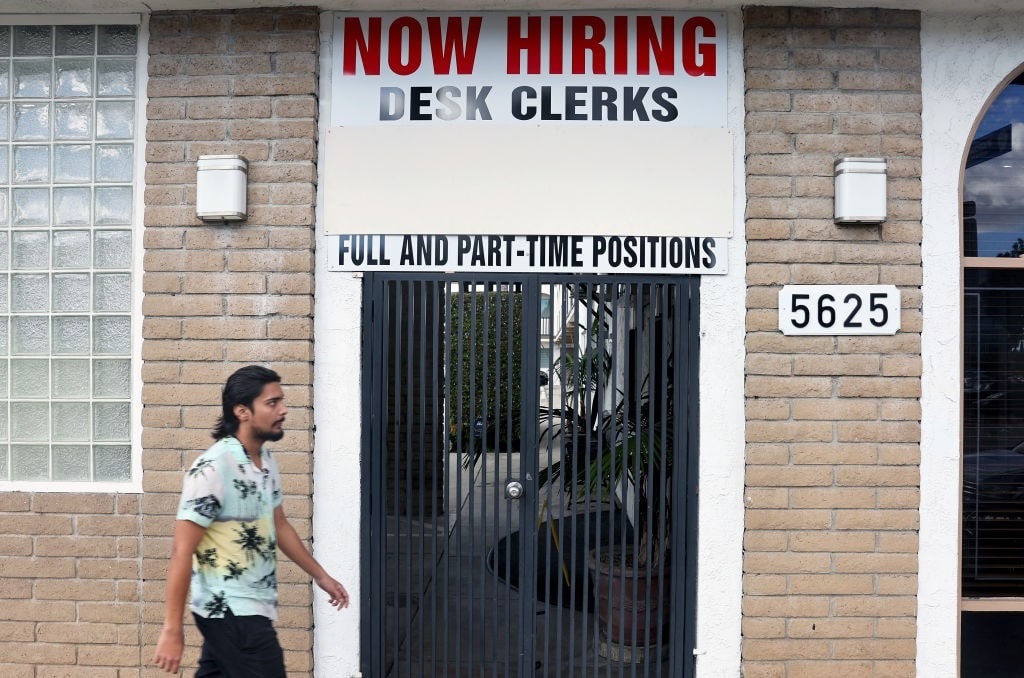Last year, the US economy added 3.013 million new jobs, and that is taking into consideration the questionable establishment survey and all of the downward revisions. Not too shabby! But while President Joe Biden may be taking a small and precarious victory lap heading into the November election, one aspect of the jobs numbers that will be swept under the Oval Office rug is that of new employment.
Is the Job Market Strong?
The Bureau of Labor Statistics (BLS) publishes the Quarterly Census of Employment and Wages (QCEW) report every three months. It is a more accurate and thorough job gauge than the monthly non-farm payroll report that everyone waits for with bated breath. However, like the headachy caffeine-deprived professional, the QCEW does not offer the financial markets and politicians the same jolt. Armchair and professional economists, be it in the Xverse or on Fox Business, enjoy it because it reflects potentially a more realistic snapshot of the job market.
 Statisticians at the Federal Reserve Bank of Philadelphia pay close attention to the QCEW figures and use them as a basis for the regional central bank’s quarterly report, “Early Benchmarks for All 50 States and the District of Columbia.” The conclusion is that employment growth was vastly overstated in 2023.
Statisticians at the Federal Reserve Bank of Philadelphia pay close attention to the QCEW figures and use them as a basis for the regional central bank’s quarterly report, “Early Benchmarks for All 50 States and the District of Columbia.” The conclusion is that employment growth was vastly overstated in 2023.
According to BLS data, payrolls expanded by 1.5% through December 2023. However, the Philadelphia Fed Bank says it was 0.5%. As they say in economics, you can always mislead, distort, or lie by utilizing percentages. Using sum values, the US government reported that by December, payrolls stood at 157.304 million jobs. The QCEW data show 156.504 million. This represents a divergence of 800,000. So, rather than the impressive 230,000 average monthly boost to the labor market, it was 130,000.
Here is a snippet from the Philadelphia Fed Bank’s report: “Our early benchmark analysis indicates that total payroll jobs fell in Delaware and New Jersey, and were essentially unchanged in Pennsylvania, from March through June 2022. These estimates are in contrast to the substantial growth indicated by the current … monthly estimates.”
This is not the first time that the Philadelphia Fed found such results. As Liberty Nation reported, the regional central bank noted in December 2022 that the BLS overstated that year’s payroll by 1.1 million. Of course, as Liberty Nation has further noted, there is an immense gap between the establishment and household portions of the monthly jobs report. Last month, the former showed 275,000 new jobs, while the latter highlighted a loss of 184,000 positions.
As the tremendous former Boston Red Sox reliever Dennis Eckersley once said, “Yuck!”
Sound Familiar?
Why does the US government overstate jobs and understate inflation? Wait a minute. Washington minimizes the inflation data, too? Shocker!
For years, LN has reported that the federal government has adjusted how it measures price changes throughout the marketplace. This occurred in the early 1980s when statisticians essentially removed the consumer price index (CPI) housing component, including home prices and personal interest payments. Today, the government views having a roof over your head as an investment rather than a need as critical as food or fuel. Why would it when housing inflation has rocketed since the coronavirus pandemic, driven by the Eccles Building’s zero-rate climate?
As FX Hedge recently wrote in a terrific newsletter, “The government stopped using real-world data and started using proxies to estimate the real-world data.” Put simply, if the BLS relied on pre-1983 methods to calculate inflation, the June 2022 peak of 9.1% would have been at least doubled. Of course, this would not look good for President Joe Biden or the Federal Reserve. But, sure, blame it on greedflation and shrinkflation.
People See Things Differently
Individuals on the ground see things quite differently from the government. This is unsurprising. In the 17th century, the French rulers resided at the fabulous palace of Versailles and were never without luxury and decadence. The royals had little understanding of what was occurring throughout the rest of the country. Today, the ruling class, from politicians to bureaucrats, rarely venture far from the corridors of power in the nation’s capital. They have no clue what is happening to a low-income family in Biloxi, MS. The government manufactures one-size-fits-all programs, whether it is data collection or federal legislation. The new Microsoft Excel formula has been easy to remember in the last couple of years: jobs go up, and inflation goes down.




